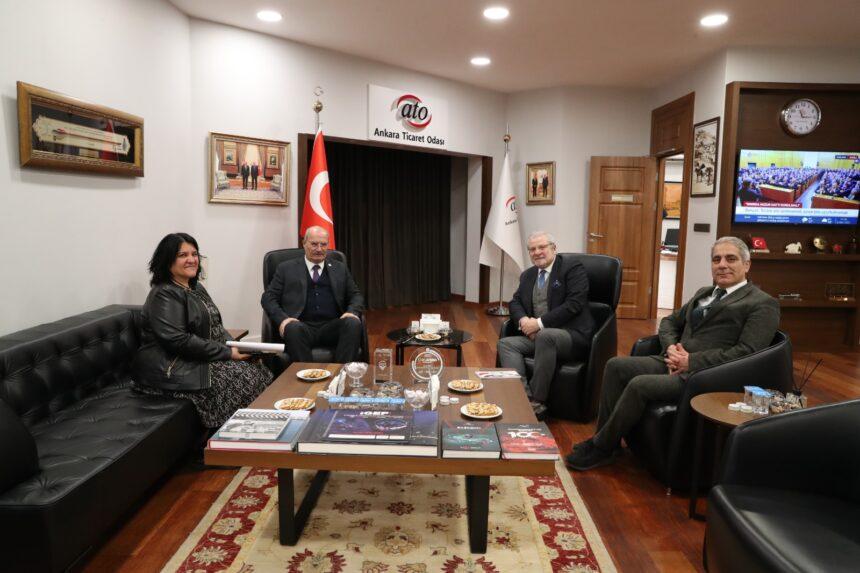MARUF BUZCUGIL – HUSEYIN GOKCE
Gursel Baran, President of Ankara Chamber of Commerce, stated that the current concordat system jeopardizes the existence of creditor companies and suggested the establishment of a concordat fund that will also protect creditors.
Speaking to Ankara representatives of EKONOMİ newspaper on Turkish economy, ATO President Baran underlines the need to protect creditors in the current concordat system:
You have been voicing the problems with the concordat procedure for some time now, could you elaborate on this?
“Unfortunately, there is no basis for the creditor to feel secure in the concordat system. While the system works with the aim of saving a company, it puts the existence of businesses that have receivables from that company at risk. In a commercial system that operates as a chain, those who cannot collect their receivables also have difficulty in paying their debts. Thus, when the chain breaks somewhere, the commercial system suffers. The impression is that the company declaring concordat applies to the court not to pay its debts, but for a protection shield.
In order for the creditors to be protected and the concordat institution to be fully functional, the payment of the receivables without any deduction in the receivables must be legally guaranteed. Otherwise, while one company is protected from bankruptcy, the way is paved for the bankruptcy of other companies.”
How did the traders spend 2023 and what are your predictions for 2024?
“2023 was an important year as it was the 100th anniversary of the foundation of our country, and this year was also the 100th anniversary of our Ankara Chamber of Commerce. The world has been going through a painful period for the last few years. The process that started with the pandemic, the Russia-Ukraine War, the disruption of supply chains, the repercussions of the food and oil crisis, 2023 was a year of difficulties in many aspects of the global economy. Immediately at the beginning of the year, the earthquake on February 6, which was described as the disaster of the century, caused devastation in 11 provinces and plunged the whole country into sadness and mourning. The whole country mobilized first to meet the needs of the region and then to rebuild the region as soon as possible. The increased intensity in the construction sector in the region where the earthquake occurred increased the demand for labor. As citizens in the earthquake region migrated to other cities, a labor shortage occurred and the region received migration for labor from other provinces. The cost of the earthquake to the economy is estimated to have exceeded 104 billion dollars. Turkey grew by 4 percent, 3.9 percent and 5.9 percent in the three quarters of last year. These data show that, despite all odds, 2023 was a positive year with positive data.”
“Higher labor costs will increase operating costs”
In our country, efforts to expand export markets continue. It is possible to say that the rise in the general level of wages will be on the agenda of our country in 2024 as it will force businesses. Rising labor costs will increase operating expenses. In 2024, the ongoing political tension in the Middle East, global recession, the effects of monetary tightening policies, access to financing problems and inflation are among the main risks. In addition to these, green transformation, sustainability and digitalization will be on our agenda. In 2024, the main goal in the economy will be to reduce inflation. We believe that the interest rate hike will not lead to a significant slowdown in the economy or cause major problems thanks to the measures taken, and we see this period as a temporary challenge to be endured in order to reach better data in the economy and to see better days as a country. As of the second half of 2024, I think we will start to see the results of the economic program more clearly.
How does the tight monetary policy affect the trade community?
“Tight monetary policy and access to finance affect trade, of course. We are living in a period when loan interest rates exceed 50 percent. As a financing opportunity, credit is very important for businesses, but this level of interest is not suitable and efficient for any business. Therefore, we are in a period where there is a shortage of resources and will be for a while.
We believe that if the decisions taken in a correct, stable and disciplined manner are implemented, and as we succeed in the fight against inflation, the improvement will be reflected in other areas.”
What are the most important problems that traders are currently experiencing and what are your suggestions for solutions?
“We can divide the problems experienced by the traders in this process into two parts. One part of these is the problems stemming from the high inflation that has been going on for more than two years, and the second part is the problems we are experiencing regardless of the conjuncture. I would like to start with the second one. As commercial enterprises, we have the problem of not being able to find employees. Intermediate staff is the most important issue in Turkey today. Hundreds of thousands of young people receive education in 208 universities across the country, but unfortunately, these skills do not intersect with the needs of the business world. The employment rate of vocational high school graduates is below 10 percent. In many fields, masters cannot train apprentices to take over their work. If our university graduates cannot find a job and our vocational high school graduates do not participate in employment, we need to sit down and think in detail about how to find a solution to this problem. The public sector’s employment and wage policies also play a major role in the real sector’s inability to find employees.”
“Different VAT rates cause problems”
“Another issue is the difference in VAT rates. In the same sector, the VAT rate is applied differently between the product used as input and the output. This situation becomes a problem for businesses in return and other procedures. Such different VAT rates put the sectors in trouble. By easing Turkey’s VAT legislation, eliminating the differences between VAT input and output, easing the burden of businesses in terms of monetary and procedural terms will relieve the real sector.”
“As for current issues, of course we are experiencing the problems of high inflation. Production costs are on the rise. Businesses have an appetite for investment and growth, but problems of access to finance are getting in the way. As a country, we need to look for ways to increase our productivity. We have a green transformation process ahead of us. This process will affect the competitiveness of all businesses in production and trade and therefore require restructuring. If we can fulfill this transformation on time and focus on increasing productivity, we will provide the appropriate ground for both the growth and development of our businesses and the growth of our economy.”
How does the limitation in the number of installments as well as the toughening of credit conditions affect the volume of domestic trade?
“Limiting the number of installments on personal credit cards is a factor that shrinks the volume of trade. Monetary tightening is also valid at this point. Although it is not a positive situation for the commercial sector, it is understandable when the long-term benefits are taken into account within the framework of our government’s policy to reduce inflation.This issue was reflected to the public with a statement by our Minister of Treasury and Finance, Mr. Mehmet Şimşek. When we visited him, I told him how much we needed this, thinking that it would also cover commercial credit cards. The Minister said that he was referring to personal credit cards in his statement. The Turkish real sector used the check as a deferred payment instrument for many years, perhaps as the first and only example in the world. However, due to the problems experienced with the check, there is a need for another deferred payment instrument. For this reason, we expressed our demand to increase the number of installments applied to commercial credit cards. Installments in commercial credit cards are very important for us.”
“License planning is required on a settlement unit basis”
“Dozens of businesses operating in the same field can trade side by side in the same neighborhood and street. Excessive number of businesses leads to unfair competition, unfair competition leads to a decrease in service quality, and bankruptcies and closures in a short period of time. Unplanned investment harms both the newly established business and other businesses operating in that area. Planning should be made for the issuance of commercial licenses or workplace opening permits, and a sectoral focus method should be followed by identifying regional potentials. In this context, when issuing licenses for commercial enterprises, decisions on which commercial enterprises can be opened in which capacity, especially zoning regulations, should be taken as a result of efficiency and efficiency-oriented planning.”
“The limit for paying taxes by credit card should be raised”
“Credit cards have entered every field, but they were not used for income tax payments. We made a persistent request on this issue. The Revenue Administration set a limit of 50 thousand liras and started tax payments by credit card. When this figure became insufficient over time, it was increased to 100 thousand, then 200 thousand and then 500 thousand liras, again with our insistent demands. However, this figure is not enough either. We demand that the limit be abolished and that the merchant be able to pay taxes with the credit card that he/she buys in proportion to his/her power. In addition, the reduction or abolition of commission rates by banks in SSI premium payments by credit card will facilitate the functioning of commercial life.”










